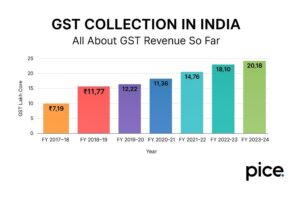What is the Impact of GST on URD Purchase of Gold?
- 16 Aug 24
- 9 mins

What is the Impact of GST on URD Purchase of Gold?
Key Takeaways
- Gold dealers face increased operational burdens due to the need for additional accounting and documentation under the Reverse Charge Mechanism (RCM).
- Dealers must manage cash flow challenges as GST on URD purchases requires upfront tax payments before claiming input tax credits.
- Adjustments in pricing strategies by dealers can lead to higher retail prices for gold in order to maintain profit margins.
- Consumers benefit from increased transparency in gold pricing, with clearly itemized taxes on their invoices.
- The overall price sensitivity among consumers may increase due to higher prices passed down from dealers, covering additional tax burdens.
The introduction of the Goods and Services Tax (GST) in India marked a significant overhaul of the tax structure, impacting various sectors, including the gold industry. URD purchases, which refer to transactions involving sellers who are not registered under GST, play a crucial role in the gold market. This section will clarify what GST and URD purchases are and their importance in the gold industry.
What is GST?
GST is a unified, destination-based tax system that replaces multiple cascading taxes levied by the central and state governments. For gold, GST has standardized the tax rate across states, which aims to bring transparency and efficiency in the trading of this precious metal.
What is URD Purchase?

A URD purchase in the context of gold means buying gold from a seller who does not have a GST registration, i.e., an unregistered dealer. This is common in the gold trading community, especially among small-scale traders and jewelers who might not exceed the threshold limit for GST registration.
Importance of URD Purchase in the Gold Industry
Unregistered Dealer (URD) purchases play a vital role in the gold industry due to their significant impact on market dynamics, regulatory compliance, and economic activity. Here’s a concise overview of the importance of URD purchases in the gold industry:
- Accessibility for Small Traders
URD purchases are crucial, as they provide access to the gold market for small traders and artisans who may not meet the criteria for GST registration. This helps sustain livelihoods and promotes competition.
- Market Flexibility
These transactions offer flexibility in sourcing gold, allowing buyers to respond swiftly to market demands without the constraints of formal registration, which is particularly beneficial during peak demand seasons.
- Local Economic Support
URD purchases support local economies by enabling transactions at the grassroots level, contributing significantly to the financial health of smaller and rural communities.
- Pricing Influence
Transactions with unregistered dealers can affect gold pricing structures. The introduction of GST and the Reverse Charge Mechanism (RCM) also influence these costs, impacting pricing strategies.
- Regulatory and Tax Implications
From a regulatory standpoint, URD purchases pose challenges in tax collection and compliance, requiring mechanisms like RCM to secure tax revenues from these transactions.
- Market Adaptability
URD purchases allow market participants to quickly adapt to changing conditions and consumer preferences, maintaining high service levels in a competitive environment.
- Encouragement of Economic Formalization
Although they offer flexibility and accessibility, URD purchases also encourage the formalization of the economy by highlighting the need for better tracking and regulation of market transactions.
GST Applicability on URD Purchases of Gold
The Goods and Services Tax (GST) applicability on Unregistered Dealer (URD) purchases of gold is an important aspect of tax regulation in India’s gold market. Understanding how GST applies to these transactions helps ensure compliance and facilitates proper tax management for both registered and unregistered entities. Here’s an overview of how GST impacts URD purchases of gold:
- GST on URD Purchases
When gold is purchased from an unregistered dealer, the buyer, who is registered under GST, has to manage the tax implications differently compared to purchases from registered dealers. Specifically, the registered buyer must adhere to the Reverse Charge Mechanism (RCM).
- Reverse Charge Mechanism (RCM)
Under RCM, the responsibility of paying GST shifts from the seller to the buyer. In the case of gold purchased from an URD, the buyer (if registered under GST) is required to pay GST directly to the government. This mechanism ensures that the government collects the appropriate taxes on transactions involving unregistered entities.
- GST Rates Applicable
The GST rate applicable to gold is 3%, and this extends to URD purchases as well. Additionally, if the gold is being processed into jewellery, an extra 5% GST is levied on the making charges. These rates are crucial for calculating the total cost and tax liability during such transactions.
- Documentation and Compliance
For registered businesses buying from URDs, meticulous documentation is essential. Buyers need to issue self-invoices for their purchases since URDs do not provide GST-compliant invoices. These self-invoices are critical for filing accurate GST returns and for claiming Input Tax Credits (ITC).
- Claiming Input Tax Credit
Registered dealers can claim the GST paid under RCM as an input tax credit, which can be utilized to offset their GST liability on outward supplies. This mechanism not only ensures tax compliance but also aids in maintaining cash flow efficiency within the business.
- Impact on Pricing and Cost Management
The necessity to pay GST upfront under RCM can affect the pricing strategies of registered dealers. They need to factor in the additional cash flow requirements and potentially higher costs of purchasing gold from URDs. These factors can influence the final price of gold products sold to consumers
- Basic GST Rates for Gold Purchasing
The current GST rate for gold is 3%, and an additional 5% GST is applicable on the making charges if the gold is being turned into jewellery. However, these rates can be subject to change based on federal budget announcements or GST council decisions.
- Specifics of GST on URD Purchases
For URD purchases of gold, the buyer (if registered under GST) has to pay GST under the Reverse Charge Mechanism (RCM). This means that the buyer, not the seller, must pay the GST directly to the government. The buyer can later claim this amount as an input tax credit (ITC) in their GST returns, which is a significant departure from the usual process where the seller charges GST.
Impact of GST on Gold Dealers and Consumers
The implementation of GST, especially on URD purchases, affects both dealers and consumers in several ways.

Stakeholder Impact of GST on URD Purchases
- Gold Dealers Increased Operational Burden: Dealers must handle extra accounting and documentation to comply with the Reverse Charge Mechanism (RCM). This increases the complexity of their operations but ensures proper tax compliance and enables them to claim Input Tax Credits (ITC).
- Cash Flow Considerations: The necessity to pay GST upfront under RCM can impact the dealers’ cash flow, as they need to finance the tax payment before they can claim it back as ITC.
- Pricing Strategy Adjustments: Due to additional tax burdens from RCM, dealers may need to adjust their pricing strategies, potentially leading to higher retail prices to maintain margins.
- Consumers Price Sensitivity: Consumers may face higher prices for gold products due to dealers passing on the additional tax burdens incurred under RCM. This can affect consumer buying behavior, particularly in price-sensitive markets.
- Transparency in Pricing: Although prices might increase, GST brings transparency to pricing, as consumers can see clearly itemized taxes on their invoices. This aids in better understanding of what they are paying for.
Challenges and Compliance for URD Purchases under GST
Complying with GST regulations for URD purchases requires meticulous documentation and understanding of the tax process.
- Documentation and Compliance Requirements
Proper invoices reflecting the RCM, regular filing of GST returns, and accurate calculation of ITC are essential for compliance. Dealers must maintain detailed records to substantiate the tax payments and claims.
- Common Challenges
One of the primary challenges in GST compliance for URD purchases is the complexity of the tax filing process under RCM. Additionally, ensuring that all ITC claims are accurate and justifiable can be cumbersome for businesses.
Conclusion
GST on URD purchases of gold introduces specific challenges and requirements for dealers in the gold industry. Understanding and complying with these regulations is crucial for maintaining operational efficiency and ensuring tax compliance. As the GST regime evolves, staying updated with the latest regulations and compliance requirements will be key for all stakeholders in the gold market.
💡Missing the deadline to pay GST payments? Download Pice and start using a credit card to pay GST on time, experience efficiency and convenience, and manage cash flow more effectively.
 By
By 
















